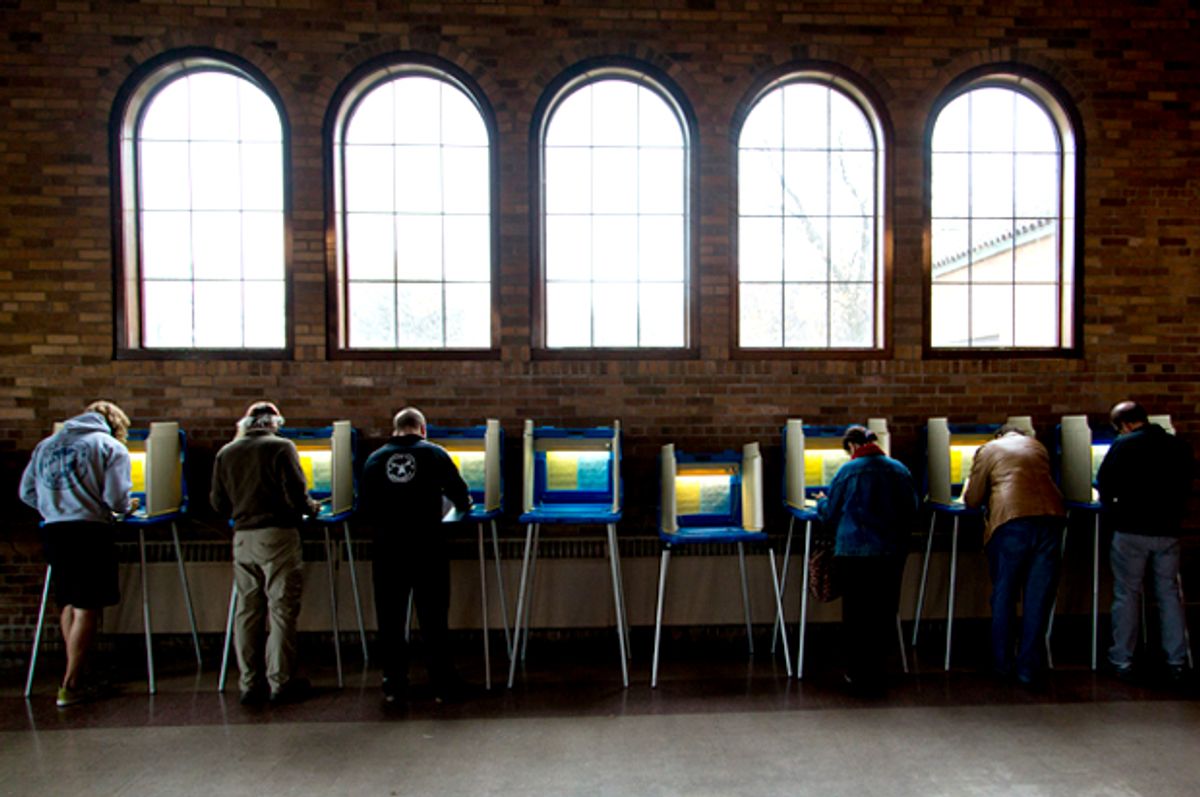Trump got one thing right. The voting system is “rigged" — though not in the way he thinks — and it has serious consequences for women.
Every election, poor folks, transgender men and women and communities of color across genders have to jump hurdles to access one of their basic American rights, thanks to new rules that shorten polling hours, cut the number of polling places in districts, change up geographic voting lines and require IDs to vote. Not the easiest circumstances for people who can’t afford to take time off or pay for costly government documents, or may not own a car.
The issue is compounded for women. Voter ID laws alone account for an estimated 34 percent of women who could be turned away from the polls for not having the right documents, according to the National Organization of Women. Because 90 percent of women change their names when they get married, they often have different names on their identification documents.
Among the people already impacted by these laws are a handful of women who face an even harder struggle. Their time, money and safety are taken for granted — all because of their gender.
Here are a few of the impacted.
Caregivers: Women make up 69 percent of unpaid caregivers to older adults. If they’re caring for someone, unpaid, that means they don’t necessarily have the means to buy documents needed to obtain an ID, pay for a car or taxi to get to a polling place, or even take the time to step away from their person in need.
“Cultural responsibility tends to fall [on women] in sense," said Vanessa Williamson, a fellow in governance studies at the Brookings Institution, a public policy organization in D.C. She says that adding obstacles to the ones they already face as women is “compounding.”
Women who are poor or work hourly wage jobs: There are more women living in poverty than men. So if voting already impacts people with less means to legally cast their vote thanks to more restrictions, women will bear most of the burden. Plus, if a woman works an hourly job, she doesn’t have the luxury of getting paid if she misses a day or leaves work early.
Vote.org founder + CEO Debra Cleaver, whose job it is to get people to vote, agreed. “Tuesday is the least convenient day for people to vote. That impacts working moms more than working dads,” she told AlterNet. “They work on Tuesday and they take care of their kids on Tuesday. It's even more impactful.”
Women who are abused: Domestic violence is a form of manipulation and the majority of victims are women. A victim of domestic violence may have no access to her own money or transportation. Her partner may be against her right to vote or even her wish to act independently.
Students: Even college students are affected by voter suppression tactics. Many students run into trouble when their addresses or IDs don't match the area where they attend school. The majority of college students? Women.
Disabled and older women: According to the National Disability Rights Network, "approximately 3 million disabled people are disenfranchised and 40 percent of those who tried to vote reported problems voting," said Maya Contreras, founder of the American Women’s Party, a new organization that educates the public on political rights. "Women who are disabled are also impacted by poverty, sexism or lack of access," she added. Women can’t vote if they can’t drive, don’t have assistance with forms or computers and if the polling places aren’t handicap-accessible.
And the problem is getting worse. Since 2010, 10 states have more restrictive voter ID laws in place, seven have laws making it harder for citizens to register, six cut back on early voting days and hours, and three made it harder to restore voting rights for people with past criminal convictions, according to the Brennan Center for Justice.
“Voter suppression has been something that’s been a hurdle for decades now. And it was very effective in this last election,” Contreras said.
While more women than men have voted in the last three elections, the restrictions could have a larger impact on smaller communities, many of them in rural or Southern states that happen to have most of the voter suppression laws.
America can’t say it guarantees the right to vote to all citizens, if at least 50 percent of its people face more obstacles than their male counterparts. This week, Donald Trump pushed to create stricter voter ID laws, despite there being no proof of the existence of voter fraud. With Republican lawmakers pushing for stricter voting restrictions, women can’t bank on their turnout, even in other cities or states, always being the same.
AWP co-founder Mia Brett explained that women need to come together and work to get rid of the obstacles that stand in their way at the polls. “We must listen to each other and not assume our experience is universal,” Brett said. “Voter suppression is something that targets many communities, and fighting it will help elect representatives that fight for all women’s issues.”




Shares